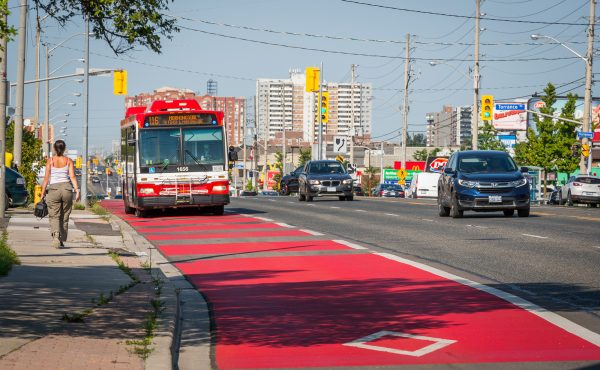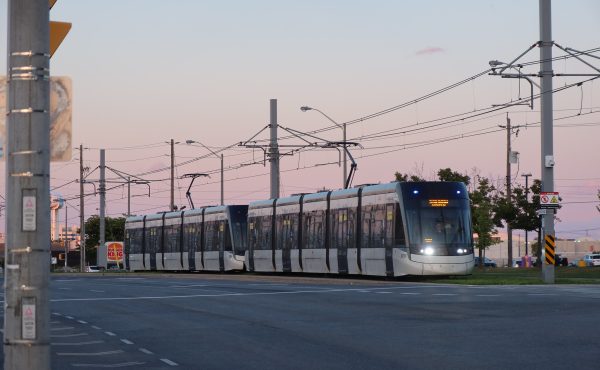
Streets Are For People! are once again engaging the public and the government in an effort to disrupt our car-obsessed society.
To celebrate Earth Day, the group is preparing to present a “petition-car†to the Ontario Legislature at Queen’s Park. The petition-car — which has been stripped of its motor and painted white — is covered with over 4,000 signatures and bears the message: “We the undersigned do hereby demand that not one more dollar go to promote, support, or perpetuate car culture. We want bike lanes, public transit and a train system. We want our public space back. We want local food, clean air, sustainable industry, a liveable future for our children, and an end to oil wars. We want to dance in the street. We want a government that values life over money.”
The group’s formal petition asks the government of Ontario to redirect the tax-dollars spent on the auto industry towards expanding public transit, developing an integrated train system, and investing in pedestrian and bicycle infrastructure. The petition also asks the government to begin the process of weaning our economy off the automobile industry by shifting Ontario‘s labour force into sustainable transportation sectors. Lastly, the petition also calls for a ban on car advertising, as according to Streets are for People! co-founder Shamez Amlani, cars “contribute to resource depletion, corporate hegemony, perpetual war, and urban decay.”
Click here to read the petition in full or to sign it.
Photo by Peyton Chung




28 comments
Certainly the money could have been spent on making Ontario the world leader in sustainable technology rather than on dying automakers. Come on though, we will still have wars, corporate hegemony, and urban decay no matter what.
We do need politicians and more of the population to reevaluate their attitudes towards cars. The hospitals need to rethink their lottery prizes too.
Yeah, good luck with that petition. It will happen when we can invent a magical time traveling device and erase the last 100 years of… everything and start again. Besides, local food still needs cars and trucks. Good luck taking that load of fresh veggies from the Holland Marsh to St. Lawrence Market via public transit.
Sidewalks are for people, streets are for wheeled transportation in all their glorious forms. 🙂
“We want to dance in the street. We want a government that values life over money.”
Uh…. as a non-activist, can someone explain to me what this actually means?
Also, I’m not clear how, as the vehicle says, “supporting our bikes” will result in not “support(ing) our wars.” Last time I checked, Afghanistan is not a major source of oil.
Sean: No truck? No problem…just bring it via train, then load it onto cargo streetcar down Spadina. All that’s needed is a little spur into Kensington Market. It would happen at night or early in the morning.
A.R.: I’m sure the neighbours of the train would be very happy with this proposal. And I’m assuming this fairy powered non-polluting train will stop at every business on every street that needs a delivery? (not to mention pick up at every business that needs to make a delivery)
Sorry for my tone in the last one.. but my point is that the development patterns of the last 100 years in North America make a train based, and more specifically non-car based, cities or urban built up areas completely impossible and unworkable. And that doesn’t even address the cost for the infrastructure, the economic impact to businesses (small and large), the economic impacts to citizens, the environmental damage caused by the need to fuel and build all the trains (etc). There is a real hard cost to all of this “petition car”‘s demands.. costs that I suspect few who signed the car considered.
A bit off topic(and yes as I push my glasses up my nose) but @tdotg
The real motive for invading Afghanistan is its importance as a conduit for oil pipelines from Azerbajian to other neighboring countries.
Afghanistan’s president Hamid Karzai worked as a consultant for Unocal.
In 1998, Dick Cheney, now US vice-president but then chief executive of a major oil services company, remarked: “I cannot think of a time when we have had a region emerge as suddenly to become as strategically significant as the Caspian.” But the oil and gas there is worthless until it is moved. The only route which makes both political and economic sense is through Afghanistan.
I think the point is that in cities the road space should be shared more evenly. As it stands now it is 99%car 1% other in terms of how road space is shared.
Sean,
Your argument that we have invested 60 years (not 100) in auto-dependent design for our communities, and thus should keep it that way, is an argument that we should continue to throw good money after bad. Societies, on occasion, make decade-long mistakes. That’s not a very good reason to continue perpetuating them. Should we have kept using lead in paint? Asbestos in insulation?
Do you think it was wrong for some Americans to destroy the Cotton industry (In the 1850s, their largest and most valuable) just because it perpetuated slavery? It had, after all, been using slaves for centuries, and there was no feasible way to end that without destroying a way of life and the infrastructure that supported it.
Your other arguments are all ad absurdum and straw-man nonsense. You completely fail to make a sensible case for why the government should continue to promote and subsidize car culture as it currently exists.
Regards,
Richard.
“The group’s formal petition asks the government of Ontario to redirect the tax-dollars spent on the auto industry towards expanding public transit, developing an integrated train system, and investing in pedestrian and bicycle infrastructure.”
I’m all for that! Unfortunately, the government’s dirty little secret is that the billions in tax dollars it has collected for “the auto industry” have already been spent on other things.
That presupposes, though, that automobile-oriented transportation systems are a mistake, a hypothesis I completely reject.
They are not at all straw-man. They are the real and predictable consequences of the scenario that was posted above mine (the train solution).
The responsibility is upon those who advocate for the radical redesign of the entirety of urban existence in Canada to put forth a sensible, cost-balanced, case. To date, all I’ve seen is non-sensical, non-cost estimated utopian dreamscapes completely devoid of evidence of the reality of the situation.
All that being said, I love Car Free Sundays in Kensington. I shutter at the thought of Car Free Toronto All the Time.
@ Tony: “I think the point is that in cities the road space should be shared more evenly. As it stands now it is 99%car 1% other in terms of how road space is shared.”
I agree completely with this. The few cities in Europe I’ve visited have shown how to do it right. Dedicated, curb-divided cycling lanes are wonderful. They show that “car culture” can co-exist quite well with bike-culture.
These only really work, though, in areas with the residential population and employment density of your typical large European city. I.e. not most of Toronto.
And I might add that I find your comparing automobile-oriented transportation systems to the murderous and terrible scourge of slavery to be really offensive.
European cities also have large scale downtown pedestrian areas, and we have enough transit and pedestrian activity so that such areas could exist here too.
We can’t just stop spending money on car transportation, but at the same there’s so much more we could do. Turning the entire city (North York et al) into a car free zone is unrealistic. But money to widen and expand highways can be better spent elsewhere. There are plans for such actions, and there’s a message being sent that continuing the same development patters is not acceptable.
“We the undersigned do hereby demand that not one more dollar go to promote, support, or perpetuate car culture.”
There’s nothing there about a train to get food to grocery stores, so let’s not waste time on that.
The message I get from the petition is to stop actively funding the car culture. The funding could be by subsidizing auto plants. Or by paying for the extension of the 404 to Lake Simcoe so people can use it toll-free. Or by allowing another car dependant subdivision to be built.
And just because our government isn’t in Iraq doesn’t mean our gas dollars don’t have anything to do with it. We support the Iraq war. It’s just that it’s really difficult to avoid. Our gasoline doesn’t come with a polar bear engraved in it.
Our provincial government, who is the key player in transportation and land use, is exactly who needs to make the changes necessary to encourage new types of developments and give people real choices in their transportation mode. They have the power to make the difference, something I’ll be thinking about when it comes time to vote.
“We want to dance in the street. We want a government that values life over money.â€Â
I think they are referring to the desire to have a more affordable and easier to obtain license for street festivals. P. S. Kensington had to cut back their number of days to once a month because they couldn’t afford the insurance.
Every city, province and state should have a petition car. Excellent idea. So many good things come out of Toronto. Wishing you the greatest success.
“Do you think it was wrong for some Americans to destroy the Cotton industry (In the 1850s, their largest and most valuable) just because it perpetuated slavery? It had, after all, been using slaves for centuries, and there was no feasible way to end that without destroying a way of life and the infrastructure that supported it.”
really?? this makes no sense. first of all slavery wasn’t ended because lincoln and the north simply thought it was bad. of course it is wrong but ask any historian, it was a strategic move to cripple the economy of the confederacy.
Also, if you dislike ‘car-culture’ because of pollution then eliminating cars seems like a much worse scenario than a well engineered alternative (aka hybrid car technology) or if its because of oil then we need to realize that gasoline is a minor part of oil consumption. im assuming that ive also failed to see some other point people try to make so i can just rest assured that the car industry isn’t going to be very threatened because my guess would be that any change will be led by these very same people.
Well if these ***** live so close to wherever they go to school/work that they can bike or walk, or if they live near public transportation, then yay for them, but maybe these ***** should think about people who don’t have these opportunities, yes? Like me. I live 10 miles from school, 20 miles from where I (hope to) work, with elevation changes of 800 feet and 1500 feet, respectively so biking and walking is out of the question even for an olympic runner and there’s not a train, subway, bus, or any other form of public transportation within 25 miles of my house.
I get really tired of greenie activists’ hypocrisy. All these **** undoubtedly live in cities where their lifestyle supports extreme population and damage to the environment, and certainly do far more harm than conservative, rural, Jeep-driving me. But hey, if they sign a car to ban all cars and drive a Toyota Prius, then it’s all okay, right?
BTW, any guesses on how they got the car there? Hmmmm….betting it got towed. And I don’t mean by a train.
Hey Willy,
We pushed the car. Every time. Maybe you wanna join us sometime. That is, if you have the guts to do something positive.
Willy,
I commute 10 miles to work on a bike, though not with your elevation change. I’ve met people who LIKE that sort of a challenge, but they’re a little crazy. Less ambitious cyclists use electric assist. Quoting a woman with a cargo bike in Taiwan:
It was the thought of climbing the hill
home (280 m or 920 feet in less than 2
miles) that kept me off the bicycle and
on the motorbike. Now, I WANT to take my xtracycle-stokemonkey because
1) I know I can get home,
2) I don’t have to buy a parking permit
for each college so I can park it inside
each campus,
3) I can ride it onto the campus (at one
campus, we can drive cars and bicycles,
but have to walk motorbikes), and
4) it hauls a whole lot more a whole
lot better than the motorbike.
You drive a car all the time, you will (probably, statistics predict) lose fitness, raise you blood pressure and cholesterol, and significantly increase your risk of heart disease. Even with the risk of accidents (the bad ones usually involve cars), the bike is safer in the long run because of the cardiovascular benefits.
All that said, I do drive often enough, but I try to avoid it whenever practical. And the more I bike, the more things are practical (including, in the snow, on the ice, in the cold, carrying 100 lbs of groceries, hauling a kid to school).
Let’s say that LA, a decidedly car-based city, decided to switch to public transit. Okay, there are 12.9 million people in the metropolitan area, which is admittedly quite large. That’s surely at the very least 10 million cars. Let’s underestimate that each car costs $10,000. Let’s also ignore the costs of fuel, car infrastructure, oil wars, etc.
That’s 100 billion dollars. Can you imagine 100 billion dollars spent on public transportation? Trains would be fast, frequent, and easy to take to practically every destination. Or 10 billion to build that system and 90 billion for health, education, etc.
So don’t say that it’s unrealistic to end car dependence. Car dependence is a plague on our economy and society, and cooperation could make our cities more pleasant and less polluted.
The fast Auto is dependant upon safe people (Foxes of Soloman, John Schiffer, 1982)
It’s a great idea. But living in Canada makes it VERY Very difficult to get around on a bike in the winter
i ride my bike daily. i do not own a car. i have not for 3 some years, and i am glad i made that choice. progressively i have become more active in bicycle awareness, earth liberation, and human rights.
on the flip side: previous to riding a bicycle; i drove a car everyday everywhere. sometimes i would nudge bicycles with my car. (maybe that is why i have been hit 5 times on my bicycle?)
the hard fact of the matter is, regardless of what side of the pole you are on the problem never changes. the problem is not: cars/bicycles, oil/patchouli, or the united states/canada. the problem is in our finger nails, eyes, and flesh. man is corrupt, the corruption hammers in every human alive today. changing the ways of industrial revolution would not fix the complicated matters of the heart. if it were not bumpers and smog killing us, it would be something else.
Cars are nice
I personally have no opinion regarding the car vs bicycle debate, however I do find it discouraging when one is not eligiable for a job because they do not have a car, specifically when the job does not require the candidate to drive anywhere or travel.
eligible*
A messy car, that picture is.With your petition,I hope it’ll be on your side.